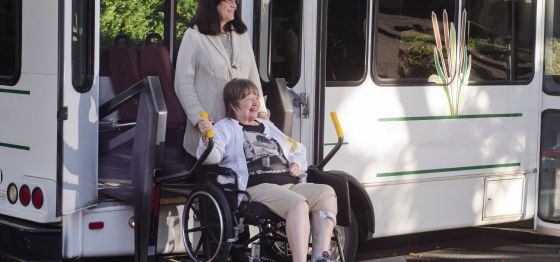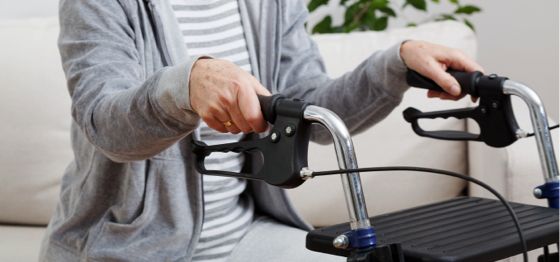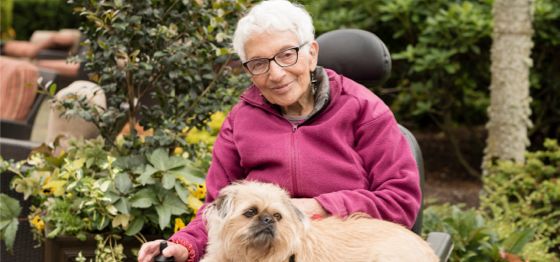While many older adults live active lives and can drive safely, more than half a million seniors—voluntarily and not—give up the car keys every year, and many more modify their driving habits in some way.1 This may severely limit older adults’ ability to get to doctor appointments, go shopping, visit their families or attend community and social activities. Consequently, their isolation increases, which may have a negative effect on their health and well-being.2
Providing senior transportation is 1 of the most common things that family caregivers do. In fact, 78% of caregivers arrange or provide transportation for a senior loved one.3 But meeting an older adult’s transportation needs isn’t always convenient or easy. “Some family caregivers just can’t leave their job every time somebody needs a ride to the doctor, much less even to the grocery store,” says Virginia Dize, a USAging program director and co-director of the National Aging and Disability Transportation Center (NADTC).4
Senior transportation options
So, what happens when a family caregiver can’t provide senior transportation? Fortunately, the variety of options below may help seniors keep their appointments, get where they need to go and stay connected to their communities.5
- Public transit
Financed and operated by federal, state or local governments, public bus and rail services offer fixed routes and set schedules, as well as discounted fares and vouchers for seniors.
- Paratransit
Public transit agencies are legally required to provide paratransit service for people who are unable to use regular lines. Paratransit vehicles are usually vans outfitted for accessibility.
- Demand response
Also known as dial-a-ride, demand response is a shared-ride service that can transport multiple seniors who book their rides individually for different pickups and destinations.
- Taxis
In addition to regular cabs, some locally licensed taxi companies include accessible vehicles and may offer taxi vouchers to older adults and/or disabled riders.
- Ride-hailing
Companies like Lyft and Uber connect passengers with drivers who’ll provide senior transportation in their own vehicles. Booking and payment are done via mobile app.
- Non-emergency medical transportation
NEMT is a Medicaid-covered benefit that provides transportation to medical appointments. Eligibility, destination types and the types of vehicles allowed vary by state.
- Volunteer programs
Some nonprofit or faith-based organizations can provide transportation to medical appointments or other destinations. These prearranged trips may require a small fee.
How to find senior transportation services
Various transit organizations have set up mobility management programs that can help caregivers and seniors find, research and book transportation services online or by phone. Caregiver support programs, elder care organizations, social service agencies, and family and friends are also viable resources. “Do a little exploration in the community about what’s available, so that even before you need the service, you know what’s available,” Dize says.6 These worthwhile search options are a good place to start:7
- Use the Eldercare Locator
Operated by the federal government’s Administration for Community Living, the website Eldercare.acl.gov, can direct older adults and caregivers to the nearest Area Agency on Aging for transportation options, information and referrals. Interested parties can also call 800-677-1116.
- Find a mobility manager
Mobility managers develop transportation programs in their communities and help individuals access the range of options in their area. Local public transit agencies, the Area Agency on Aging or the Center for Independent Living can connect caregivers and seniors with a mobility manager if 1 serves their area. The National Center for Mobility Management also offers an online directory of various regional and state programs.
- Dial 211
Covering all 50 states, Puerto Rico and the District of Columbia, 211 service reaches nearly 95% of the U.S. population. This phone code is for callers needing information and referrals for health and social services in their community, including transportation for seniors. More information is available at 211.org.
Questions to ask about senior transportation services
Not all senior transportation services are created equal. These are good questions to ask when considering all the options:8
- Availability—what hours and days does service run?
- Eligibility—are there age, disability or income requirements?
- Scheduling—is service booked ahead or on demand? Is there an app?
- Service area and trip type—are rides limited by geography or destination?
- Accommodation and assistance—will wheelchairs or walkers fit? Do seniors get entry and exit help?
- Cost and payment—are there senior discounts? Will Medicaid or insurance cover fares?
- Driver credentials—are drivers background-checked, specially trained and licensed?
Go365 by Humana® makes wellness fun and easy. We help Humana Medicare members with Go365® on their plan reach health goals, as well as take care of their physical and emotional health—allowing members to thrive at any age.
Humana Medicare members with Go365 on their plan can enroll in Go365 at
Go365 is a well-being and rewards program for many Humana Medicare Advantage members. Rewards have no cash value and can only be redeemed in the Go365 Mall. Rewards must be earned and redeemed within the same plan year. Any rewards not redeemed by December 31st will be forfeited.
If you need to enroll in Medicare Advantage or change your plan outside of the usual Medicare Annual Election Period, a Special Election Period (SEP) could be the answer. For information on eligibility, visit Humana’s
To learn more about Humana Medicare Advantage, call to speak with a licensed Humana sales agent at 1-844-321-5843 (TTY:711), Monday – Friday, 8 a.m. – 8 p.m. local time or visit
Sources:
1“Transportation,” US Aging, last accessed May 10, 2023,
2“Transportation: What Caregivers Need to Know,” AARP, last accessed May 10, 2023,
3“Older Adults and Transportation,” National Aging and Disability Transportation Center, last accessed May 10, 2023,
4“Transportation: What Caregivers Need to Know.”
5“Transportation: What Caregivers Need to Know.”
6“Transportation: What Caregivers Need to Know.”
7“Transportation: What Caregivers Need to Know.”
8“Transportation: What Caregivers Need to Know.”
This information is provided for educational purposes only. It is not to be used for medical advice, diagnosis or treatment. Consult your healthcare provider if you have questions or concerns.
Humana is a Medicare Advantage HMO, PPO and PFFS organization with a Medicare contract. Humana is also a Coordinated Care plan with a Medicare contract and a contract with the state Medicaid program. Enrollment in any Humana plan depends on contract renewal.





